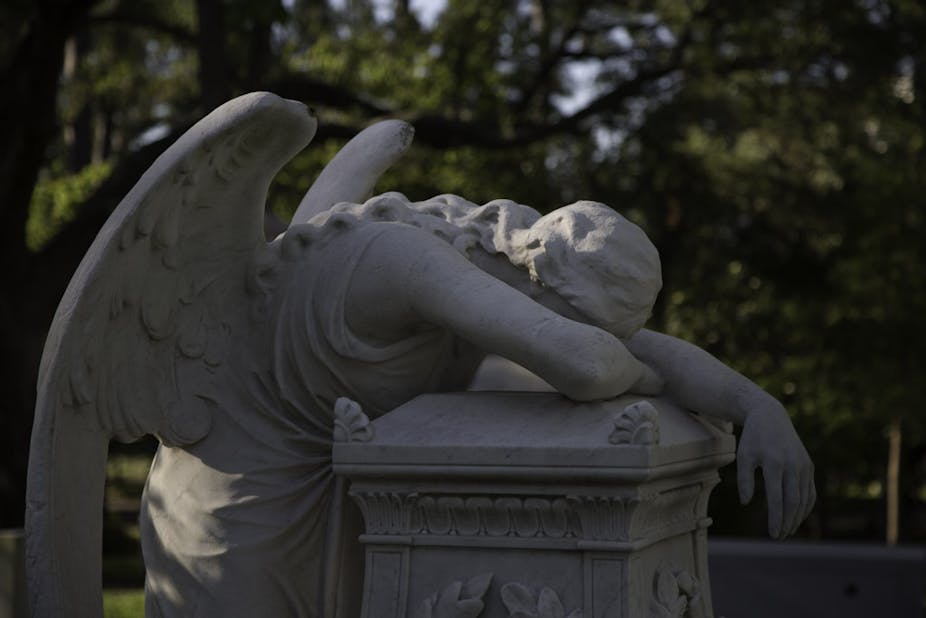When I was three years old my brother was born. He had a heart condition, and after being in and out of hospital for the whole of his little life, he died when I was five. The time after he was gone was a long and empty period of terrible loneliness and the hollow aching of grief. His death has quite literally marked me, the way all tragedies mark us, particularly when they happen when we’re small.
Even after all these years, there is still a raw place inside that is close enough to the surface to open up again with any big blow and all but double its impact. Even after years of therapy. Even with a long and involved period of training to be a therapist. Even with everything I supposedly know about losses and their impact.
There’s nothing particularly special about this story. While most of us imagine grief should be temporary, our optimism about the transience of loss is not supported by the facts. The death of children and of siblings affects the quality of the rest of our lives. The death of a parent when we are young has [long-term measurable impacts ](http://www.psy-journal.com/article/S0165-1781(1400632-5/abstract?cc=y) on our mental health.
Closure doesn’t appear to be an accurate metaphor for the general course of our human bereavements. Instead, “normal” grief can last in some form for a lifetime.
But we don’t appear as a society to be too keen on the facts when it comes to grieving.
Like many therapists, I get a lot of people who come through the door thinking there’s something wrong with them because they’re feeling the loss of someone who has died, left or disappeared long ago. Often they ask me why they still sometimes cry.
Sometimes I ask them to tell me why they think they shouldn’t still be sad. And most of the time we come to the conclusion they’re in my office so I can somehow put a cork in it for them so they can stop upsetting their families and the rest of the world.
Because somewhere we still believe that grief is contagious, and that if we’re too heavily exposed to the grief of others, we’ll catch it. As if sadness were an airborne disease, we avoid exposure by keeping our distance. This is a canny little psychological two-step that allows us to pretend the grieving person in front of us is suffering in a way that we will never be forced to suffer.
When of course they’re simply exposing us to what we may have once felt and will most definitely feel some time in the future. We put an “if” firmly in front of our fears of death. If I die, if you were to die, if my baby dies. The bereaved threaten to take all of our “ifs” away.
Years ago, on the phone to my long-widowed grandmother, I was bellyaching about having a small child and never ever having any time alone. Between my work-at-home husband and my baby, I was going mad for lack of solitude. She reassured me with cronish honesty that my life wouldn’t be this way for ever.
You will be alone again, she said, you will have all the time in the world to yourself one day. I couldn’t get off the phone fast enough.
We want to avoid the brutality of death at all costs. And one of the ways we do this is to shoot death’s messenger. A recent comment posted on The Conversation about Helen Garner’s latest work, referred to her as “ghoulish” for her focus on death and dying. It’s an interesting choice of words.
Ghouls are meant to be disgusting creatures who feed on the corpses of the dead. Ghouls remind us of how thin the line is between our lives and the grave. When they knock on our doors at Halloween we’re supposed to scream in fright and offer them sweet things to buy them off, in the hope they’ll settle back down in their tombs and won’t come again to bother us. But they are sure to return, they always do.
Since the death of my brother 43 years ago, a great deal has changed for the better in our understanding of grief. If he were dying today, we would not be asked to leave the hospital when the short window of visiting hours was over, leaving him alone and us bereft.
My parents would not have to field suggestions that perhaps a funeral is no place for a child. He would be included in a relative’s rendition of our family tree, instead of left off in order to avoid being “morbid”. We would be offered counselling and no one would suggest the birth of my sister would make it better, as if she was some kind of human spare tire.
And of course this would all have been better. Immeasurably so.
But what is still so hard for us to face, is that his death, like all unwanted deaths really, would still have been an unmitigated disaster. It still would have hurt like hell. It would still have opened a door that could never fully be closed again.
And maybe that’s the grief work we have yet to do as a culture. To make more room for the ghouls that live among us and find their way into all of our houses, one day, bringing grief that takes its own sweet time to soften.
The Conversation is currently running a series on Death and Dying.

